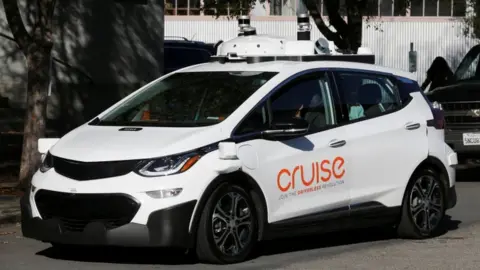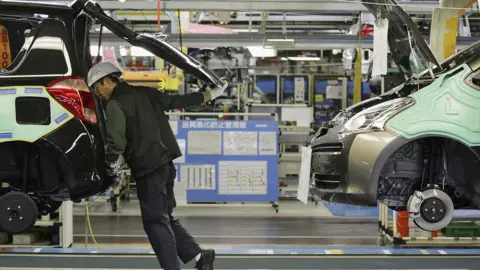Honda to invest $2.8bn in GM's self-driving car unit
 Reuters
ReutersHonda is to invest $2.75bn (£2.1bn) and take a stake in General Motors' self-driving unit, GM Cruise, as firms continue to team up in the race to develop autonomous vehicles.
The Japanese carmaker said it wanted to develop a self-driving car that could be mass produced.
It comes as Toyota and Softbank created a new venture to develop transport services using autonomous vehicles.
A series of accidents have left some consumers wary of driverless cars.
'Mobility services'
Under the tie-up with GM, Honda will contribute approximately $2bn over 12 years to self-driving vehicle initiatives, which together with a $750m equity investment in Cruise, brings its total commitment to the project to $2.75bn, the two firms said in a statement.
Analysts have said that GM is among the leaders in the development of self-driving vehicles.
Earlier this year, Japan's Softbank invested $2.25bn in GM Cruise. Honda's investment in GM Cruise, together with Softbank's recent investment, values the firm at $14.6bn.
Softbank has also announced a partnership with Toyota to provide "new mobility services", which includes the development of autonomous services.
The Japanese pair have created a joint venture partner called MONET - short for mobility services - that will start with 2bn yen in capital.
It plans to use Toyota's electric cars to provide autonomous services in the coming years.
"Possibilities include demand-focused just-in-time mobility services, such as meal delivery vehicles where food is prepared on the move, hospital shuttles where onboard medical examinations can be performed, mobile offices," the companies said.
 Getty Images
Getty ImagesThe rush to develop self-driving technology comes amid some consumer concern over safety.
Uber briefly suspended self-driving cars tests in March after a fatal accident in the US, while a self-driving car owned by Apple was involved in an accident this month.
San Francisco-based GM Cruise, which developed Chevy's first driverless cars, argues the technology it is working on allows self-driving cars to see more than a human driver would.
In each car, 10 cameras are installed that take pictures at a frequency of 10 shots per second.
"We see more of what is going on around the car at any given time than a driver can," GM Cruise said.
